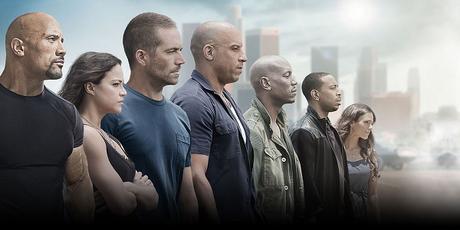
OMG, you guys, xXx: Return of Xander Cage just opened to a massive $61.9 million in China, which is the biggest opening for a Hollywood movie in China this year as well as a far more impressive total than the $42m Xander has made in its first 24 days in the US and Canada. What does this mean for the future of cinema?
Not a damn thing, that's what. It's simply the latest in an increasingly long line of movies to flourish in the East after floundering in the West, to the point that we seem to barely even notice it anymore:
Tell us in 2015 that Furious 7, already a huge hit with $353m in the US and Canada, made a record $390m in China, and we'll act with the appropriate surprise and crank out think piece after think piece which all essentially amount to, "What happens to Hollywood movies when they all have to be language-neutral spectacles to play in China? And what happens when China inevitably gets sick of them, particularly as its own film industry continues to grow?"
Tell us in 2017 that a movie ( Xander Cage) starring one of the guys from Furious 7 (Vin Diesel), co-starring two popular Chinese actors (Donnie Yen, Kris Wu) and produced by a studio (Paramount) already deeply in bed with China (they have a $1 billion financing deal with the Shanghai Film Group and Huahua Media) is a bigger hit over there than here then we'll ask why exactly we should care. Movies suck. TV rules. Drop the mic.
However, this comes at an interesting time for US-China relations. President Trump recently capitulated to China's demands that he walk back his recent rhetoric challenging the "One China Policy," and earlier today China publicly blamed the US and Japan for North Korea's banned ballistic missile launch over the weekend. If North Korea is to ultimately be kept in check the world will likely need China's co-operation considering how dependent the former's economy is on the latter, yet there remains the possibility the Trump Administration will pursue many of the things candidate Trump promised on the campaign trail, such as labeling the Middle Kingdom a currency manipulator.
Hollywood is watching all of this as well as every other part of life of under Trump through its typically liberal lens, rallying the resistance to Trump's various policies, but from an economic standpoint many of the Hollywood film studios need relations with China to remain cordial.
It's simple: You go where the audiences is, and there are now more movie theaters in China than there are in the US, the first time any country has surpassed us in that category. However, the film studios still only get a 25% cut of Chinese ticket sales for their movies, and have to comply with local censorship laws (no ghosts, nothing that could upset the local character and morale in the country, etc.) and compete to be one of the 34 foreign films allowed into the country per year.
Hollywood needs relations with China to remain stable enough to be able to renegotiate, particularly at a time when China's negotiating power in this arena is ever-so-slightly damaged after ticket sales essentially flat lined last year after a near decade of constant double-digit growth. However, if the federal government pushes China they can push back at us any number of economic ways, including in our film industry.
It is likely no coincidence then that on the same day the Trump Administration made nice with China the country's state-backed newspaper The Global Times predicted the foreign film quota will jump from 34 to 46 and the profit sharing will move from 25% for the studios to something closer to the 40% they currently enjoy in most other foreign territories. These jumps will occur after US and China film industry representatives meet later this month, and if The Global Times' predictions prove to be correct then we could soon see even more movies making more over there than here as well as more co-productions (like The Great Wall) and Chinese movies starring Hollywood actors (like Johnny Knoxville in Skiptrace). If all goes according to plan for Hollywood, the days of a huge Chinese opening for xXx: Return of Xander Cage being considered even remotely newsworthy could be numbered because it will become so commonplace, even more so than it already is.
A Partial Listing of the "Bigger in China" Club
China - $190m
US/Canada - $47m
Difference: $143m
2. Transformers: Age of ExtinctionChina - $320m
US/Canada - $245m
Difference: $75m
3. Furious 7China - $390m
US/Canada - $353m
Difference: $37m
4. Expendables 3China - $72m
US/Canada - $39m
Difference: $33m
5. Now You See Me 2China - $97m
US/Canada - $65m
Difference: $32m
6. Mechanic: ResurrectionChina - $49m
US/Canada - $21m
Difference: $28m
7. Terminator: GenisysChina - $113m
US/Canada - $89m
Difference: $24m
8. Need for SpeedChina - $66m
US/Canada - $43m
Difference: $23m
9. Billy Lynn's Long Halftime WalkChina - $23.7m
US/Canada - $1.7m
Difference: $22m
10. xXx: The Return of Xander CageChina - $61.9m (and growing)
US/Canada - $42m
Difference: $19.9m
11. Escape PlanChina - $40m
US/Canada - $25m
Difference: $15m
12. Kung Fu Panda 3China - $154m
US/Canada - $143m
Difference: $11m
13. Pacific RimChina - $111m
US/Canada - $101m
Difference: $10m
14. Seventh SonChina - $27m
US/Canada - $17m
Difference: $10m
15. Brick MansionsChina - $29m
US/Canada - $20m
Difference: $9m
16. The WalkChina - $13.7m
US/Canada - $10.1m
Difference: $3.6m
17. Ice Age: Collision CourseChina - $66m
US/Canada - $64m
Difference: $2m
18. CriminalChina - $15.7m
US/Canada - $14.7m
Difference: $1m
19. Cloud AtlasChina - $21.7m
US/Canada - $21.1m
Difference: $0.6m
20. The Last Witch HunterChina - $27.4m
US/Canada - $27.3m
Difference: $0.1m
21. The Great WallChina - $170.4m
US/Canada - TBD
Source: THR , BoxOfficeMojo


